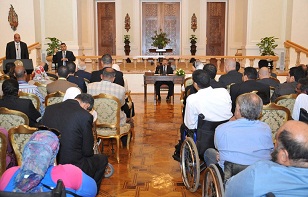CAIRO: The Treaty of Lisbon, which came into force in December 2009, doesn’t signal a change in European Union foreign policies, but it would be felt in few structural changes, Ambassador of the European Union Delegation in Cairo, H.E. Marc Franco told Daily News Egypt.
In a press conference held last Monday to mark the Spanish assumption of the EU presidency, a month after the treaty came into force, the Spanish ambassador to Egypt Antonio Lopez Martinez pointed to the promotion of Europe as a global player as one of four priorities of his country’s presidency.
Martinez explained that issues such as the enlargement of the EU and the European Neighborhood Policy are high on Spain’s agenda. For example, the Union for the Mediterranean, which has sent some setbacks due to tension between the Arab states and Israel following its offensive on Gaza last year, is due to be relaunched soon.
But the Lisbon Treaty – which was explained in detail during the conference and whose implementation is also part of Spain’s priorities that also include fighting economic poverty and European citizenship in the 21st century and gender equality – wouldn’t have a direct effect on shaping these treaties or European foreign policies in general.
Egypt’s relations with the EU under the European Neighborhood Policy for example won’t see changes under the Treaty. But eventually, Egypt would see the structural change of shifting responsibilities from the representative countries to the EU delegation representation. While some 60 countries have already seen this shift, the Spanish embassy in Egypt remained in charge such responsibilities because it was organizing joint EU conference in Cairo during these six months.
One of the major structural changes already in force would be combining into one the positions of the External Affairs Commissioner, previously held by Benita Ferrero-Waldner, and High Representative for the Common Foreign and Security Policy, previously held by Javier Solana who was also the Secretary-General of the Council of the European Union. The new post is held by Catherine Ashton, High Representative of the Union for Foreign Affairs and Security Policy of the European Union.
The treaty also introduced, the first permanent president of the European Council, currently held by Belgium’s Prime Minister Herman Van Rompuy. He will lead the Council for a two-and-a-half-year term, renewable once.
During the press conference, both Martinez and Franco emphasized on the hope that the treaty will help make the European Union’s decision making more effective and especially more democratic.
The treaty is designed to streamline the decision making and representation of the European Union. Critics had said its enforcement would diminish national sovereignty of the member state.
For the EU to avoid becoming the “Big Brother as Franco said, the national parliaments of the states have the possibility to stop any legislative act that they feel goes against their policies. The treaty also allows qualified majority voting system to replace the unanimity requirement in many fields, except for tax, foreign policy, defense and social security.
The treaty also provides citizens with the “Citizen Initiative, where one million citizens can sign a proposal to the Commission, he added.


